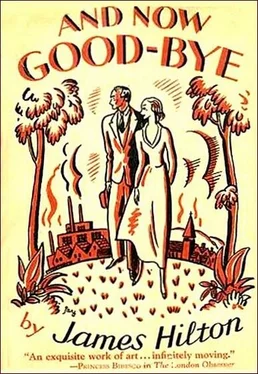“Well,” he said, smiling at her.
She moved back to the mantelpiece and stood again with her heels on the fender-rail. “Must you go?” she said, casually.
“Well…it’s late, isn’t it?”
“I’m going to make myself some coffee before I go to bed.
“I think perhaps—”
“It’s probably too late for you to find a taxi in the streets. There’s a telephone in the other room—I could ring for one when you wanted it.”
“Well…”
“Take off your coat for a few minutes. I’ll light the fire. After all, they told me to make myself comfortable, didn’t they?”
She knelt on the rug to strike a match, and the gas-fire lit with a loud pop. When she rose he saw that her eyes were wet with tears. “I’d—I’d much rather—you didn’t go till—till I’ve made you some coffee,” she said, in a level voice.
“All right,” he answered cheerfully. He took off his overcoat and almost flung himself into one of the deep armchairs that lay about. “I agree with you,” he added, with a sort of forced nonchalance, “this room does make one feel at home. You’ll have a job to turn me out of it if you’re not careful.” He laughed and she laughed also, and then went out to the little kitchenette that adjoined the studio.
Chapter 9. Saturday Morning
He lounged by the fire while she made coffee. A certain outward excitement died down in him, and he began to feel very cosy and tranquil and quietly talkative, so that when she brought the coffee and sat opposite him at the other side of the fire, they both plunged into chatter about the concert and music and other topics as casually as if the time and the place had been utterly normal. He felt, as he sat there, that he would like nothing better than for such a thing to happen after every long day of his life—to talk thus, and drink coffee, with her at the other side of a fire. It was something else in life that he had missed, and was now enjoying with all the more relish because till then he had never even guessed its existence—this pleasant comradely domesticity of two persons sitting up late to talk together after everyone else had gone to bed. A dreamy tenderness enveloped him as he gazed across at her; and gradually, in the midst of that tenderness, there grew in him the thought that she was beautiful. Like the lovely figurehead of a ship, he had imagined formerly, but now he imagined much more—she seemed to him rather like every beautiful thing there ever was or had been in the world—like Brahms, Raphael, William Blake…
They talked for over half an hour before he said he would have to go. “Really, I must—it’s nearly half-past two, and I don’t believe there’s a night-porter at my hotel. I assure you I don’t want to go a bit—I’m so comfortable here.”
“Are you?”
“Yes, I’m hating the thought of going out into that cold street, but it’s got to be.”
“I’m hating the thought of you going.”
“Yes, it’s lonely for you by yourself. You’re not nervous, are you, in a strange place?”
“No, no…” She seemed all at once filled with regret too intense even to try to conceal. “I’ll go then and ring for a cab for you.”
She hurried away and he heard her switch on the light in some further room. Left alone, he had a disconcerting vision of Browdley as it would await him on the morrow, of his prim and comfortless study, of the routine of weeks and months and years reaching into the future, of being an old man some day. Such thoughts induced him in a gloom which was all the harder to endure after his previous serenity—come now, he thought, as she returned, let’s say good-bye and get it over quickly. “I think I’d better go down and wait in the street,” he said, “the man will never find his way through that narrow entry. No, you mustn’t come with me, it’s far too cold. Don’t bother to come down even—I’ll let myself out. Thanks for the coffee. And remember what I said—if there’s ever any way I can help you, write and tell me…The very best of luck…Good-bye, Elizabeth…Goodbye, my—my dear girl…” He did not look at her while he was speaking—come on, come on, he urged himself, don’t linger and make it all more difficult…
Those few words; that quick handshake; and he was down the stairs, feeling for the door-catch. In another moment the door closed behind him and he stood shivering in the night air. He felt chilled and numb, with a little pinpoint of misery somewhere inside him that was expanding with every second. The world hung still and silent; it would take a minute or two, no doubt, for the cab to arrive. He paced up and down a short stretch of pavement, trying not to think, not even to feel.
Then, in the darkness of the yard whence he had come, a patch of light shone suddenly; he stared round, and saw her standing at the doorway. Never had his whole being swung into keener ecstasy than at such a reprieve—a few pitiful seconds snatched from an eternity ahead. He went back, trying to seem rather offhand and casual. “You shouldn’t,” he began, but he could hardly control his voice, “you shouldn’t have bothered to come down. It’s too cold for you to stand here. Do please go back. The cab will be up in a minute—there’s really no need—”
“Come here,” she whispered, clutching his sleeve. Dimly he wondered, and when she drew him into the little lobby at the foot of the stairs, the wondering grew to a tingling excitement. “That cab,” he stammered, “I must keep a lookout for that cab…
“It won’t come…Howat, I never rang for it…I couldn’t—I found I couldn’t…Are you very angry with me?”
The world dizzied about him, and he took her closely into his arms with all his senses brimming over. He did not and could not speak, but he knew bewilderedly that he had wanted her like that. After a moment, and without a word between them, they climbed the stairs and stood again in that warm, companionable room; it seemed full of welcome now. He took her to him again and the sweetness of her body streamed into his, and made him feel like a youth about to conquer the world. She clung to him with that strange, simple intentness that was in the way she talked and looked; he still could not think of any words, but she said to him, in a calm whisper: “I do love you so much, Howat. I can’t help it. It began all the time you were giving me those lessons—all the time you weren’t taking any notice of me. Of course it was absurd—that’s what I told myself then—but now it doesn’t seem absurd any more. It’s everything else that seems absurd now.”
“Yes, yes—I know.” His mind was tremulously aflame at her confession, but especially at her mention of those earlier meetings; somehow the realisation that her love had come spontaneously and long before his, lifted him to a supreme pinnacle of rapture. “My dearest child…” he began, and meant to say such infinities of things, but found he could not progress beyond those few words. They drew away from each other then, and she went on talking in abrupt but still calm sentences. “Howat, I couldn’t help it. I. tried, but it was no use. And I’m glad now that this has happened—yes, I’m glad, even if you aren’t.”
“But I’m glad too.”
“Are you? You don’t think you’ll begin to hate me as soon as you get back to Browdley?”
He said then, only just audibly: “Impossible to do that—impossible…And as for Browdley—”
She watched him in gentle silence, and he saw the future dissolving into new backgrounds of such impossibilities. He felt as if he were sitting in the stalls of a theatre, seeing the curtain rise on the strangest and newest of plays, the play of the life which he himself had yet to live. He returned her gaze incredulously, and the thought came to him: Every day and night for so many years I have praised God with my lips, but now for the first time I praise Him with all my heart. He sank into a chair, silenced with thankfulness, and she came to him then; she sat on the arm of the chair and drew his head against her small firm bosom. “How tired you must be, Howat,” she whispered. That enchantment of her bodily nearness soothed him; he did feel tired, but somehow eager as well, and he knew that he could rest, because she understood utterly both his eagerness and his tiredness. He closed his eyes and visions crowded on him—of music and painting and poetry and all the beauty of line and contour; a hundred sensuous images took meaning, while tunes raced through his mind with sharp unlooked-for harmonies; the whole world seemed on fire about him, while he, at its centre, found peace on the breast of this girl. “I can’t go back,” he stammered, huskily. “I can’t…Do you realise that? Do you realise what you’ve done?”
Читать дальше











